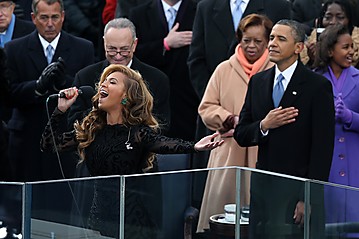Last week in class the topic of
online debates was brought up. Many people brought forth very interesting examples
of online debates relating to politics, gender discrimination, entertainment
and other such topics.
One online debate that was circulating
for a while and got me particularly heated in class was the question of whether
famed singer Beyoncé Knowles lip-synced her performance
at the presidential inauguration ceremony on January 22,, 2013. As
it turned out the singer, known for powerful pipes, did admit to lip-syncing at
a press conference, but not before showing the world that just because she lip-synced didn’t mean she couldn’t do the exact
same performance live. She began the press
conference by singing the national anthem loud and proud and later explained
the reasoning behind the decision to lip-sync at the inauguration was due to
technicalities and lack of rehearsals, which made her uncomfortable doing the
performance live.
Just a few weeks later the star
burned the stage up and caused a power outage during her Superbowl halftime
performance. Audiences around the world were in awe by her post-baby body and
incredible LIVE performance.
Talk of her inauguration performance has died down, however, in the heat of it
all I can say that the debates around Facebook and online blogs were quite
intense. I can admit that I participated in some civil debates over Facebook as
well.
However, in stepping back and
analyzing the topic of online debates such as these via the comments on blogs
or on social networking cites, it simply goes to show how incredibly rapidly
information goes viral and how every individual who wants to, can give their
opinion. No matter how informed or uninformed one is on a topic, everyone in
this online public sphere has a voice. One’s post may be read by only two
people or it may be read by thousands, but chances are someone at some point
stumbles across it. Moreover, no one can technically silence anyone. Everyone
is essentially equal. Obviously there are those people with more followers on
their blogs or on twitter, and those more prominent opinion leaders in the
community (some might refer to bloggers like Perez
Hilton for that- personally I wouldn’t, but just as an example since the
number of people that follow him is massive), who will always have a greater
impact on society as a whole, but, regardless, each and every single online
contributor (via youtube, blogs, twitter, etc. …) has a voice that can get
heard, despite the number that hear it. Personally, I think this is one of the
greatest benefits of the Internet itself and Mr. Habermas would likely agree
with me on this statement.
The prominent artist and thinker Andy Worhol said it right…
“In the future everyone will be world-famous for 15 minutes.”
Welcome to the future.


I definitely agree with you that the ability to voice our comments online has to be one of the greatest benefits of the Internet, because even though there are always going to be "trolls" or negativity, it can work the other way too. Without that we're just bystanders which would make the Internet a very uninteresting place. I think the biggest factor behind these comments is the fact you can be anonymous online too and by being a part of the masses they're just fueling the fire. This is a good post and really makes you think what someone would do just for their 15 minutes of fame.
ReplyDelete